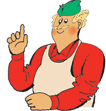Subscription
Agribusiness Russia hardly adapted to the WTO

<p>Last year, the industry began to operate under heightened competition in connection with Russia's entry into the World Trade Organization.</p>
Today the site of the Ministry of Agriculture of the Russian Federation published some of the findings of the Department of Economics and Public Support APK on the impact of the rules of the World Trade Organization on the state of the agro-industrial sector in Russia. Despite the fact that in comparison with the year 2012 Russia's membership in the WTO will not have a material impact on their output of domestic agricultural products , in certain areas of the deterioration of economic conditions of agricultural production. According to the operative data of the Federal Customs Service , in the first nine months of last year, Russia imported foodstuffs and agricultural raw materials to 29,852 million dollars. This is 5.4% more than the previous figure . At the same time a decrease in imports of meat and meat products by 14% , including pork and lard - by 14.3 %. Volumes of supplies of pork , excluding data on trade with Belarus and Kazakhstan decreased by 14.5 percent. In general, there is a decline of 3.2% of imports of poultry meat ( excluding data on trade with Belarus and Kazakhstan ) . However, delivery of broilers U.S. rose by 2.7%. Also the trend of reduced supplies of breeding animals , including cattle - by 37.9 % , pigs - by 8.3 times . Remains relevant question of the level of tariff protection for rice and pork in general, especially for the supply of live pigs . Russian Ministry of Agriculture does not remove it from the agenda and plans to conduct intensive negotiations with colleagues on the WTO. Export of foodstuffs and agricultural raw materials for nine months in monetary terms amounted to 10 billion 600 million dollars, it is 13.6 % less than in January-September 2012 . It should be noted that in general, over the past year, exports were 20 % higher than in 2011 , mainly due to the sale of the grain after the lifting of the embargo in 2011 . The share of domestic agricultural products and foodstuffs in the total resources of the internal market (taking into account the structure of carryovers ) estimated in 2013 will be: Grains - 98.8 % ( 3.8 percentage points higher than the threshold set in the Doctrine of food security of the Russian Federation , approved by Presidential Decree of January 30, 2010 № 120 " on approval of the food Security Doctrine of the Russian Federation "); - Potato - 97.6% (up 2.6 percentage points ); - For vegetable oil - 81.4 % (up 1.4 percentage points ); - Sugar - 93.8 % (up 3.8 percentage points) ; - For milk and dairy products - 76.9 % ( by 13.1 percentage points below the threshold ); - Meat and meat products - 77.3% ( 7.7 percentage points below the threshold , but 2.5 percentage points higher than in 2012 ) . Russia becoming a full member of the World Trade Organization , has committed to binding state support to agriculture under the " amber box " to reach up to U.S. $ 9 billion for the period up to and including 2013 and phased reduction to 4.4 billion dollars by 2018. The current agreement on the amount of reduction measures 'amber box' to 2017 allows for all the routines for the development and modernization of domestic agriculture , provided by the State program . Four years later, there is a fear to go beyond the set limit volumes of state within the " amber box ". Last year, the federal agricultural officials began work on reductions in subsidies under the " amber box " by expanding "green papers " by allocating funds to an unrelated per hectare support. Amendments were made in the 264th Federal Law "On the development of agriculture ", defining criteria for adverse agricultural regions , in order to implement additional measures of state agriculture (Federal Law of July 23, 2013 № 236 -FZ "On Amending article 7 of the Federal Law "On the development of agriculture "). Work on the concept adopted to support domestic producers and processors of agricultural products on the basis of the internal mechanisms of food aid within the 'green box' . On the one hand, it solves the problem of providing priority support for the most needy , do not have sufficient funds for a healthy diet, the other - domestic producers and processors receive a long-term order for production . Currently, in some regions are already being implemented "pilot" projects such programs. Given a number of restrictions on the volume and applied mechanisms of state support for agriculture , one of the major challenges in the coming period is the adjustment of government support measures for areas with a view to their adaptation to the conditions of reference to " green box ." Further work is needed regarding the development and application of such mechanisms to support agriculture, which , without prejudice to domestic producers would fit into the norms and rules of the WTO. Our task - to systematize operating at different levels of the budget system of agricultural support measures .




